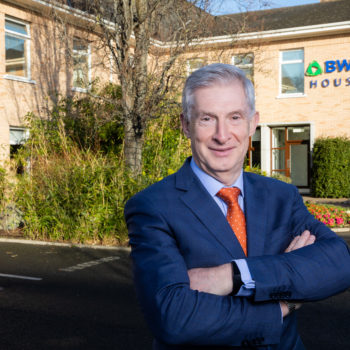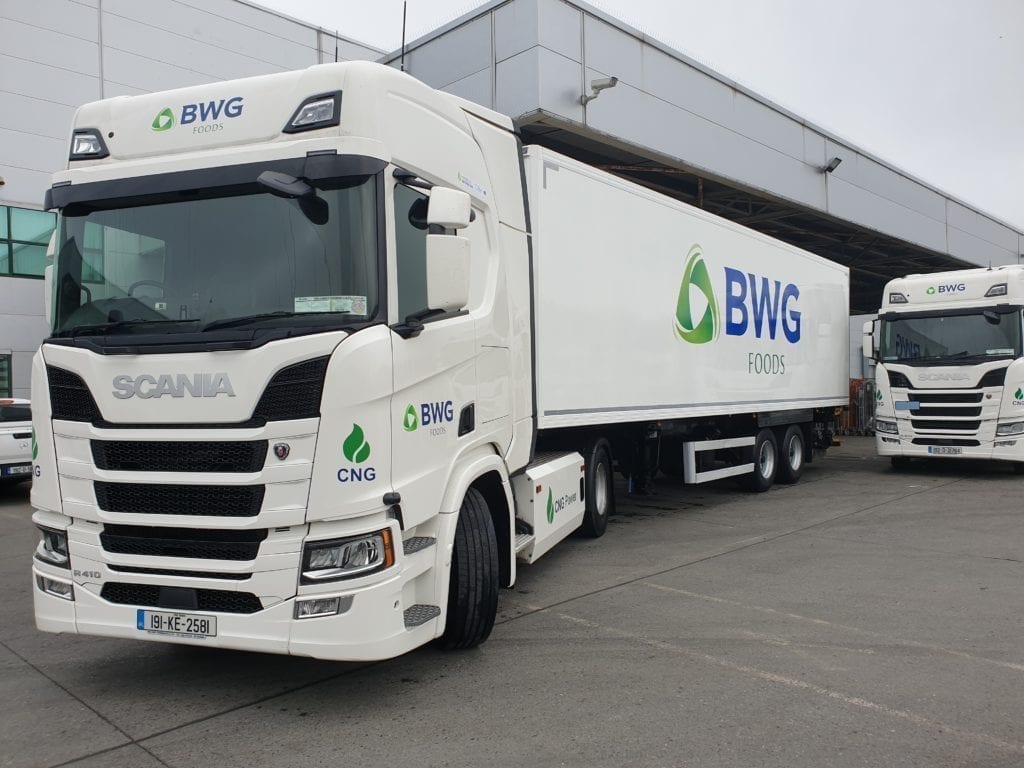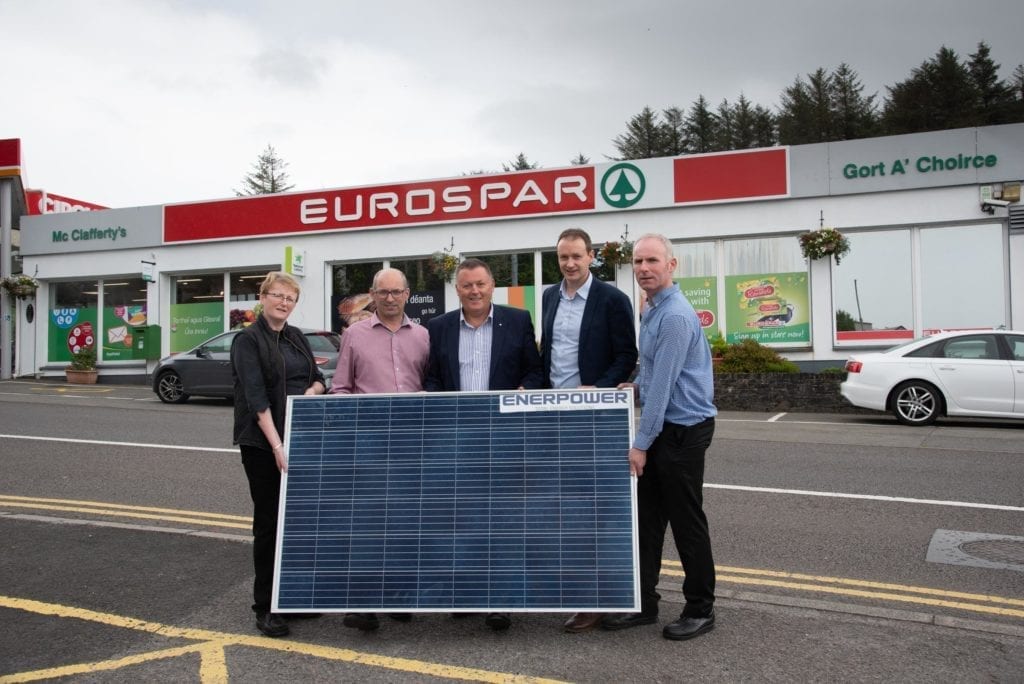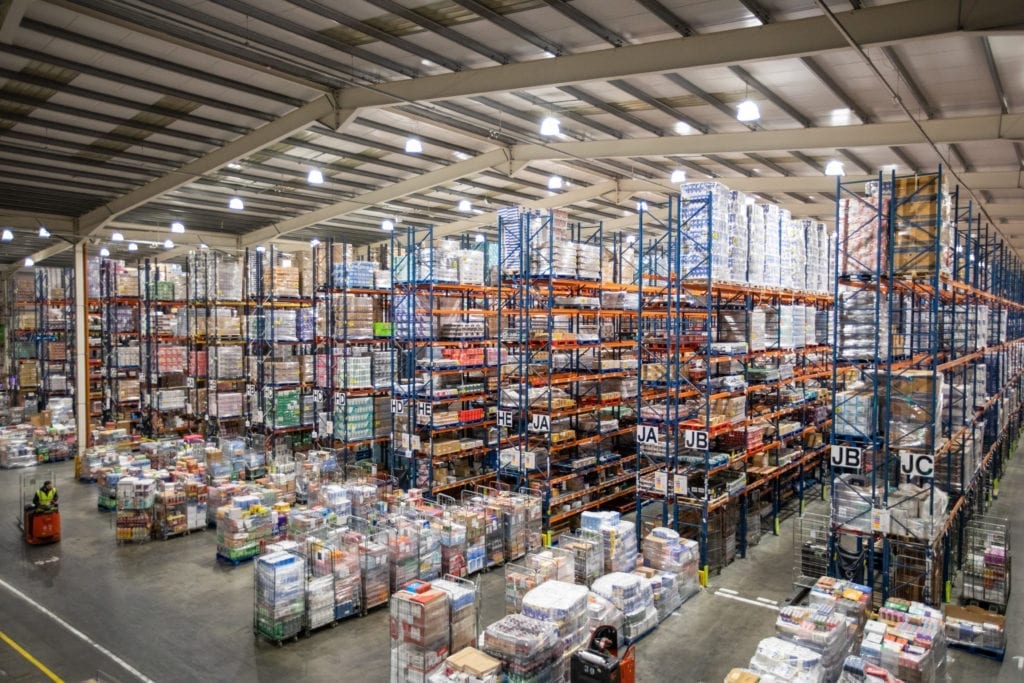BWG pioneering the way for sustainable business

A number of new initiatives including the use of CNG fuelled trucks and solar powered energy is ensuring that BWG Foods is not just paying lip service but genuinely innovating and leading the charge in the area of sustainability. Fionnuala Carolan spoke to Willie O’Byrne, managing director, BWG Foods, about the acceptance that going green is the only option
26 March 2020
While they say charity begins at home, so too it seems do good sustainable practices. When ShelfLife met Willie O’Byrne for a chat about the company’s sustainability credentials, he arrived with a keep-cup coffee in hand. Disposable cups, as we all know, have been identified as a huge contributor to everyday waste in this country. BWG Foods is determined to change the practice of using disposable cups in its head office and will be adding a rinse function for reusable cups to all of its coffee machines this quarter. The company has plans to further incentivise employees to reuse their cups throughout the day by asking those who do take a disposable cup to make a donation to charity. The company is targeting through this initiative to reduce disposable cup usage by 90%.
What sustainability means in business
While this is a great initiative, it’s only the tip of the iceberg of what is evolving in one of the country’s largest retail groups that has a 52% share of the convenience market. O’Byrne says sustainability is entwined with each and every part of the business, believing that sustainable business practice will not be a differentiator in business in the near future but the only practice. He explains why. “We have accepted that root and branch change is necessary to secure our future. Today husbandry is back in vogue,” says O’Byrne. “You need to know that the business can be just as good this year as next and that we are not just using up resources that are finite.”
BWG Foods is currently working towards Bord Bia Origin Green accreditation. “It forces a pressure on us not to just pick and choose initiatives but to do the whole bit right,” he says.
Hitting the road

In 2019, BWG Foods announced an €11 million investment over the next five years, beginning with the launch of a fleet of 14 compressed natural gas (CNG) vehicles to replace the old articulated diesel trucks
Putting their money where their mouth is, late last year the company announced an €11 million investment over the next five years, beginning with the launch of a fleet of 14 compressed natural gas (CNG) vehicles to replace the old articulated diesel trucks, at an initial cost of €2 million. Each of BWG Foods’ new trucks will complete approximately 120,000 kilometres each year, each truck saving at least seven-and-a-half tonnes of CO2 emissions in the process. When biogas becomes available for use, BWG Foods intends to use that and the company projects that CO2 emissions from its new delivery fleet will decrease by approximately 90% compared with today’s levels.
“When it comes to the heavy transport that we are involved in, there isn’t an electric truck yet that is viable for the distances we do. That’s why when it has come to transport, we have put our backing into compressed natural gas as a fuel,” explains O’Byrne.
So, what makes CNG fuel better than diesel? “At the end of the day CNG is still a carbon fuel,” he says. “What it is though is a much cleaner fuel and in terms of actual efficiency, you have a 22% betterment over diesel. So, in that sense you are generating less carbon gases. “Also, CNG can very easily be substituted with biogas,” O’Byrne adds. “Our plan is to eventually use it as our preferred fuel of choice and we now have a trial with a biogas producer to go 100% biogas in two of our new units. We will use these for city centre work rather than long distances.”
Rerouting and consolidated deliveries
While the cleaner fuel is a very welcome innovation, BWG Foods is also trying to reduce the number of miles covered with a re-routing programme which has led to the reduction of more than 2.3 million kilometres travelled annually. Increasing individual delivery vehicle capacity by 15% has further reduced the number of journeys required.
“While CNG fuel will reduce your emissions, rerouting and dynamic routing changes the amount of mileage you do,” says O’Byrne. “A drawbar trailer where you effectively have two trailers on the same tractor unit can significantly reduce your mileage. When you look at the matrix of the stores, consolidated deliveries are very important too. For instance, we now deliver ambient, fresh, frozen and alcohol on the one truck. Until recently, they would have all been delivered separately. A lot of these things are good for the environment but also good for business so it’s win, win.”
Solar energy

Eurospar Gortahork’s installation of solar panels has seen a 15% reduction in carbon emissions and energy bills. Pictured at the supermarket in Donegal were: Marie McClafferty, Pat McClafferty, Eurospar Gortahork; Malachy Hanberry, managing director, Eurospar; John Carty, projects director of Enerpower and Thomas McClafferty, Eurospar
Last year BWG Foods partnered with Enerpower to encourage independent retailers to improve their green footprint by installing solar panels on their stores. Leading by example again, the company installed 794 solar panels on the roof of its national distribution centre in Kilcarbery. “Because we have a chilled plant there, there is quite a high electricity demand in Kilcarbery and we are generating around 20% electricity from these solar panels, which is really quite significant,” O’Byrne tells ShelfLife.
The first retailer to take the plunge was Eurospar Gortahork in Co Donegal. Since the store installed solar panels, it has seen a 15% reduction in carbon emissions and energy bills.
The solar panel scheme is one of a number of affinity schemes that the company has pioneered. A scheme in conjunction with Electric Ireland for the rollout of LED and sensor lighting across the network has been hugely successful in recent years.
BWG Foods has also started to roll this initiative out across its full retail estate of Spar, Eurospar, Mace, Londis and XL convenience stores.
Food waste
BWG Foods has had a longstanding relationship with FoodCloud, the social enterprise that connects businesses’ surplus food to charities. The most visible activity is during the company’s annual trade show whereby at the end of the show, FoodCloud removes all the fresh product and redistributes it to charity, equating to 10 tonnes of food. BWG Foods also links in with FoodCloud through its cash and carry business. “Across our cash and carry network,” says O’Byrne, “there will always be product that you have to withdraw from sale and we link in with Food Cloud on that.”
When fresh food has surpassed the date that even FoodCloud can accept it, BWG Foods has found a novel way to dispose of additional food waste. “When we have product that FoodCloud can’t accept, our biogas producer will use it as part of the feedstock that becomes the biogas that goes into the trucks so that’s a very nice closing of the loop.”
O’Byrne is also keen to highlight the work that is being done by Repak across the sector. “We are proud members of Repak,” he says. “Our retailers are working to best Repak practice. Some of that money generated is used in relation to our own waste but a lot of that money goes to support the green bin scheme across the country.”
Replacing plastic
One of the first successful countrywide sustainable practices was the introduction of the plastic bag levy in 2002. Trying to reduce plastic across society is an ongoing process. Plastic is widely regarded as something that we need to replace. However, O’Byrne has another viewpoint. “We’d like to eliminate all plastic but the plastic is actually improving shelf and product life so there is definitely an equation between waste and longevity of product. It’s not just a simple matter that you take one out and suddenly the world is better off. We want to find ways where we use recyclable, reusable products without compromising on quality.” The company is currently replacing the black trays on its own brand Glenmór meat range and trialling compostable trays for its Fresh Choice range of fruit and vegetables.
A lot of work is being done behind the scenes on replacing plastic packaging on pallets and shrink wrap, a process that is not visible to the public. The company has also tried to eradicate the amount of paper that is being used with deliveries by replacing the traditional ‘print packs’ which can include reams of paper with electronic goods-received notes that feed into the integrated EPOS and accountancy package in stores.
Leading the charge

At BWG Foods’ national distribution centre in Kilcarbery, the company in partnership with Enerpower installed 794 solar panels on the roof, with the result that 20% of the NDC’s electricity is derived from these panels. This is in conjunction with their previous initiative of installing LED and sensor lighting at the 250,000 sq ft distribution centre
It is evident that the company is receptive to any new technologies that will make savings to its business and contribute to its green credentials. O’Byrne explains there was a youth parliament in the Dail recently and one of the recommendations was that there would be a mandatory application of doors on fridges in retail to reduce emissions. “We have been working on an alternative to fridge doors,” he explains. “We have partnered with a company that has designed an air curtain which insulates the chilled part of the fridge from the rest of the shop by manipulating the way the air is ducted. With this technology you can walk down a refrigerated aisle without feeling cold. It keeps the cold in and the heat out. So that’s been a really interesting technology and one we would like to investigate further.”
An engineer by trade, it is evident O’Byrne is genuinely interested in and open to new technologies and keen to be seen as an innovator. He is happy with the strides the company is making but says he is also keenly watching what is happening elsewhere. “You’d be very arrogant if you are not open to the initiative and the enterprise of your competitors. I would watch them all and am very happy to copycat and I’d like to think that in many things, we are ahead of the curve. It’s very hard to deny that there’s a five to midnight element of what’s happening at the moment and in the context of civilisation, five to midnight can be 50 years or 100 years but it is short in the context of all time. If we are to make a difference to forces of change already impacting the planet, then we have to consume what is renewable and at a rate that replenishment copes with demand. Sustainable business is about doing things that have a long-term future for your business.”



 Print
Print





Fans 0
Followers